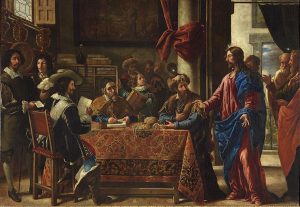Illuminations on the Lectionary readings for June 11, 2023 (Pentecost 2A)
First Reading (Track One): Genesis 12:1-9
The church’s vestments and liturgical colors are green again: The six-month-long stretch of Sundays after Pentecost will continue until Advent begins in November. Churches may follow either of two Lectionary tracks, each following a different set of First Readings and Psalms.

La vocación de San Mateo (“The Calling of St. Matthew,” 1661), oil painting on canvas by Mikeal Juan de Pareja (c.1606-1670). Museo del Prado, Madrid. Juan de Pareja, who pictured himself on the far left of this painting, was a Black artist and the senior assistant to the famous artist Velazquez. (Click image to enlarge)
In Track One, the first readings will follow the Hebrew Bible’s story of God’s chosen people, from the patriarch Abraham to Isaac, Esau and Jacob, Joseph, Moses and Joshua. In our first reading, we meet Abram, whom God will later rename Abraham. Even at the advanced age of 75, Abram’s faith empowers him to follow God’s challenging call to uproot his family and begin a long journey from his home in Ur (in present-day Iraq) toward the promised land. In return, God will bless Abram and his family, and through them, all the families of the Earth.
First Reading (Track Two): Hosea 5:15-6:6
Through the long stretch of Sundays after Pentecost that has now begins, churches may choose to follow either of two Lectionary tracks, with separate First Readings and Psalms. The Track Two first readings from the Hebrew Bible show a theme or theological point related in some way to the week’s Gospel. We begin with a reading from the Hosea, who prophesied while Israel’s Northern Kingdom came under threat from the Assyrians in the 8th century BCE. God has turned away in anger from the people, not to return until they repent, acknowledge their guilt and seek God’s face. In beautifully poetic terms, the prophet imagines God’s voice: “What shall I do with you, O Judah? Your love is like a morning cloud, like the dew that goes away early.
Psalm (Track One): Psalm 33:1-12
Psalm 33 is a hymn of praise and thanksgiving for a just and faithful God who inspires the people’s songful worship and their fearful awe. The Psalmist sings of a God who loves righteousness and justice, who fills the Earth with steadfast love. Through God’s word the heavens and earth and all that fills them were made: “He spoke, and it came to be. He commanded, and it stood firm.” Happy is the nation, the Psalmist sings, whose God is the Lord. Happy are those who are chosen as God’s heritage.
Psalm (Track Two): Psalm 50:7-15
Echoing God’s righteous anger against the people as prophesied by Hosea in the Track Two first reading, the portion of Psalm 50 that we read this Sunday warns that God has high expectations of the chosen people and will not hesitate to punish those who stray from the right path. The Psalmist imagines these fearful words: “O Israel, I will bear witness against you, for I am God your God.” How can the people do God’s will? Don’t sacrifice bulls and goats, the Psalmist advices worshipers at the ancient temple. Rather, offer a sacrifice of thanksgiving and make good your vows to the Most High.
Second Reading: Romans 4:13-25
Our second readings this summer will offer us a deep dive into Paul’s Letter to the Romans that will continue into September. In this, his last letter, Paul is reaching out pastorally to a Christian community that he had not yet met. He hopes to reconcile tensions within a faith community that included both Jewish and Gentile Christians at a time when the Jewish Christians had been exiled and were just now returning to a Gentile community that had gotten used to worshipping without them. Paul reminds both parties that Abraham’s descendants received God’s promise under the law, while Gentiles who become Christians now receive it through their new faith. We are all children of Abraham and Sarah now, Paul assures them, through faith in Jesus’s death and resurrection.
Gospel: Matthew 9:9-13, 18-26
After having spent much of Lent and Eastertide hearing selections from John’s Gospel, we now return to Matthew for the remainder of the Lectionary year. Sunday’s Gospel tells of the calling of Matthew. Jesus had a bad reputation for hanging out with sinners, outcasts and people the authorities considered mighty suspicious: Prostitutes, drunks and lepers; women, foreigners, and maybe worst of all, tax collectors, those despised collaborators who extracted the Roman empire’s taxes from their neighbors. People like Matthew, who despite his outcast status as tax collector hurried to follow Jesus … and invited him home for dinner. Jesus shows us how to love our neighbors – all of our neighbors – not just the ones who look and think like us. Then we skip ahead a few verses and hear Matthew’s account of Jesus healing a woman with a hemorrhage and returning a dead girl to life. Both of these women would have been considered unclean under ritual law, but as Jesus said, “Those who are well have no need of a physician, but those who are sick.”
What are “Track 1” and “Track 2”?
During the long green season after Pentecost, there are two tracks (or strands) each week for Old Testament readings. Within each track, there is a Psalm chosen to accompany the particular lesson.
The Revised Common Lectionary allows us to make use of either of these tracks, but once a track has been selected, it should be followed through to the end of the Pentecost season, rather than jumping back and forth between the two strands.
For more information from LectionaryPage.net, click here.
